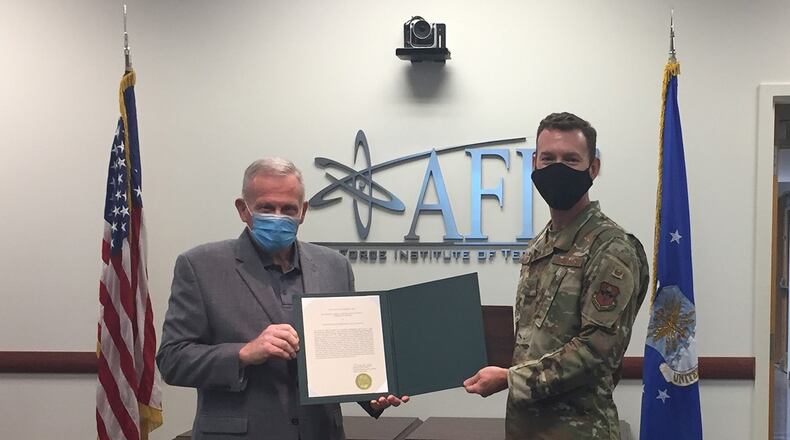In April, all of the Air Force Institute of Technology’s in-person courses transitioned to distance learning, something never before implemented in AFIT’s history. In-person research activities were significantly impacted, but with precautions in place, more than a dozen space-related thesis topics were presented under COVID-19 constraints in partial completion of graduation requirements.
The center anticipates an additional 16 Master of Science graduates for AFIT’s annual graduation ceremony in March 2021. Upon graduation, these students will have completed the majority of their astronautical engineering and space systems degrees under COVID-19 constraints.
“I’m very proud of our faculty, staff, and students for the way they successfully adapted to the unprecedented shift in classroom and laboratory dynamics. Resilience and a focus on mission are the defining characteristics of our team that enable us to persevere while mitigating the health risks associated with COVID-19 transmission,” said Col. Timothy Albrecht, CSRA director.
This past year, AFIT began offering a graduate space systems certificate for students not enrolled in the astronautical engineering or space systems MS degree programs. The core courses of the certificate span the areas of spacecraft dynamics, space environment, and spacecraft design. These courses provide a common breadth of knowledge and the basic building blocks for all Air Force and Department of Defense space systems engineers. For students who qualify, the certificate is offered via distance learning and in-residence.
The Department of Aeronautics & Astronautics enrollment numbers for 2020 saw an increase of 28 new MS and PhD astronautical engineering and space systems students from various space-affiliated organizations throughout the DoD. Three recently enrolled students transitioned to the United States Space Force through a virtual ceremony held on September 15, 2020.
Technology and collaborations
To assist in the fight against COVID-19, CSRA’s additive manufacturing laboratory printed face shield prototypes for the National Air and Space Intelligence Center to extend the longevity of N95 masks in April.
The 88th Medical Group at Wright-Patterson AFB tested the prototypes to determine if they were approved for use. In total, parts for 72 face masks for WPAFB Fire and SFS Security Forces were printed.
In the realm of space research, AFIT CSRA’s SkyPad, a payload aboard the U.S. Air Force Academy’s FalconSat-8 spacecraft bus, an experiment hosted on the X-37B Orbital Test Vehicle, was successfully launched on 17 May.
The payload employs an experimental suite of components for demonstration in the space environment. This collaboration also provides a platform for graduate research and hands-on education in mission analysis and design, payload hardware and software development, integration and testing and on-orbit experimentation.
In addition, AFIT’s Space Object Self-Tracker experiment, launched in June 2019, was declared fully operational in July. The SOS provides daily data messages containing its current position and velocity in space. The data from AFIT’s SOS experiment is now being used to qualify and further develop the next generation of autonomous, onboard satellite navigation and mission planning software.
“SOS data will be used in both the classroom and for further research. Our collaborative relationships with sponsors like the Air Force Research Laboratory’s Space Vehicles Directorate provide our students with unique opportunities to receive both a hands-on space education, while also making a research contribution to the larger space community,” said Dr. Rich Cobb, CSRA associate director.
In March, CSRA welcomed its first international intern, 2d Lt. Paul Gindre from the French Air Force Academy (L’École de l’Air); another history-making milestone for the Center. Lt. Gindre’s research involved small spacecraft systems engineering. One major benefit of this collaboration was the ability to start a dialogue with a fellow NATO member for space systems design, development, and testing. The internship also laid the foundation for future research collaboration in space, as well as other technical/engineering disciplines across AFIT. In relation to the Center, the internship enhanced its diversity by bridging international cultures to create a collaborative environment for space research and analysis.
Awards and recognition
The most notable highlight of the year was the United States Space Force’s individual selection of three CSRA faculty members to transfer into the USSF.
In April, AFIT CSRA was selected as the recipient of AFIT’s 2019 “Team of the Year” award, and the AFIT-level nominee and Air University winner of the General Muir S. Fairchild Educational Achievement Award for 2019. The General Muir S. Fairchild Educational Award was established in 1964 to recognize the most significant contribution to Air Force education.
The second annual Graduate School of Engineering and Management award winners from the Center were Maj Robert Bettinger, 2020 GSEM Early Career Achievement Award, and Maj Joshuah Hess, 2020 GSEM Teaching Award
About the Author
